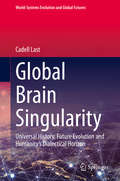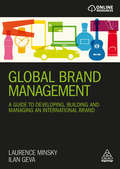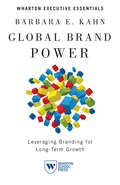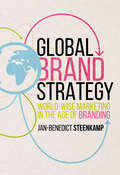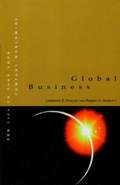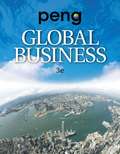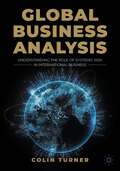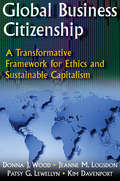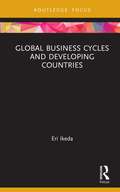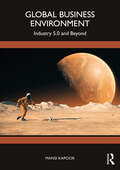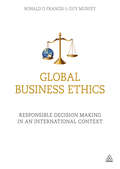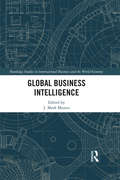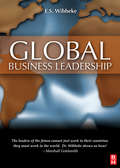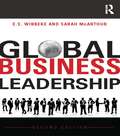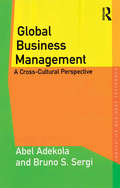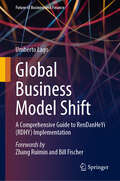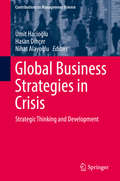- Table View
- List View
Global Big Business and the Chinese Brewing Industry (Routledge Studies on the Chinese Economy)
by Yuantao GuoFrom the 1970s to the 1990s, China implemented a wide array of industrial policies to build up indigenous big business groups in their attempts to ‘catch-up’ with the industries of the developed world. With its entry into the WTO, China is under huge pressure to pursue the market-friendly policies advocated by the advanced economies. This is the first book in English that applies the theories of big business, catch-up and state intervention to the Chinese brewing industry. Having gathered first-hand research in China, Yuantao Guo analyzes the relationship between big business, competition and state intervention in the context of developing economies, demonstrating the implications of the industrial concentration and value chain integration of the global big business revolution for catch-up by developing world industries, considering to what extent state intervention can allow them to meet the competitive challenge. Examining these themes in relation to the Chinese brewing industry, Yuantao Guo uses detailed case studies of the Yanjing and Tsingtao breweries in order to detail the struggles that Chinese brewers have faced. This book makes a significant contribution to modern day discussions on globalization.
Global Bioethics: An introduction (Advancing Global Bioethics Ser. #10)
by Henk ten HaveThe panorama of bioethical problems is different today. Patients travel to Thailand for fast surgery; commercial surrogate mothers in India deliver babies to parents in rich countries; organs, body parts and tissues are trafficked from East to Western Europe; physicians and nurses migrating from Africa to the U.S; thousands of children or patients with malaria, tuberculosis and AIDS are dying each day because they cannot afford effective drugs that are too expensive. Mainstream bioethics as it has developed during the last 50 years in Western countries is evolving into a broader approach that is relevant for people across the world and is focused on new global problems. This book provides an introduction into the new field of global bioethics. Addressing these problems requires a broader vision of bioethics that not only goes beyond the current emphasis on individual autonomy, but that criticizes the social, economic and political context that is producing the problems at global level. This book argues that global bioethics is a necessity because the social, economic and environmental effects of globalization require critical responses. Global bioethics is not a finished product that can simply be applied to solve global problems, but it is the ongoing result of interaction and exchange between local practices and global discourse. It combines recognition of differences and respect for cultural diversity with convergence towards common perspectives and shared values. The book examines the nature of global problems as well as the type of responses that are needed, in order to exemplify the substance of global bioethics. It discusses the ethical frameworks that are available for global discourse and shows how these are transformed into global governance mechanisms and practices.
Global Boards
by Andrew Kakabadse Nada KakabadseProviding an insightful and challenging view of board functioning, governance application and top director interaction with business and the state. Scrutiny of board practice in countries as China, Russia, Turkey and Kazakhstan, establishes as many realities concerning governance and boards as there are nations, cultures, boards and directors.
Global Brain Singularity: Universal History, Future Evolution and Humanity’s Dialectical Horizon (World-Systems Evolution and Global Futures)
by Cadell LastThis book introduces readers to global brain singularity through a logical meditation on the temporal dynamics of the universal process. Global brain singularity is conceived of as a future metasystem of human civilization that represents a qualitatively higher coherence of order.To better understand the potential of this phenomenon, the book begins with an overview of universal history. The focus then shifts to the structure of human systems, and the notion that contemporary global civilization must mediate the emergence of a commons that will transform the future of politics, economics and psychosocial life in general. In this context the book presents our species as biocultural evolutionary agents attempting to create a novel and independent domain of technocultural evolution that affords us new levels of freedom.Lastly, the book underscores the internal depths of the present moment, structured by a division between subject and object. The nature of the interaction between subject and object would appear to govern the mechanics of a spiritual process that is key to understanding the meaning of singularity inclusive of observers. Given its scope, the book will appeal to readers interested in systems approaches to the emerging world society, especially historians, philosophers and social scientists.
Global Brand Management of Anheuser Busch InBev's Budweiser
by Jill AveryBrian Perkins, chief architect of the $6 billion Budweiser brand, was excited about 2018, in which the company would launch Budweiser into several new markets in Africa and Latin America. He was also feeling the pressure to finalize a global brand strategy that would define Budweiser's value proposition and guide its development and execution around the world. The problem was that Budweiser actually had two distinct brand realities that differed across geographies and that often interfered with each other. He worried whether the company could keep selling a premium brand proposition abroad as the brand's reputation faced challenges at home in the U.S. and whether he needed to force a monolithic global brand strategy everywhere or allow for local market customization. Could Budweiser simultaneously accommodate two or more brand realities?
Global Brand Management: A Guide to Developing, Building & Managing an International Brand
by Laurence Minsky Ilan GevaIn today's hyper-connected world, any brand with a website or digital presence is 'global' by its very definition; yet in practice it takes an enormous amount of strategic planning and adaptability to successfully manage an international brand. Global Brand Management explores the increasingly universal scope of brand management. In an era when many brand managers will find themselves working for large multinationals operating across varied territories, categories and consumer groups, developing an understanding of both the opportunities and risks of multinational brands is truly essential. Meticulously researched, Global Brand Management shows readers how to manage an existing global brand, while simultaneously equipping them with the skills to build one from scratch. The text uses fascinating case studies including Oreo, Harley Davidson and Xiaomi to demonstrate the challenges of maintaining a stable brand identity when operating across territories with different languages, cultural values and logistics. With helpful pedagogy throughout and built-in features to enhance classroom learning, Global Brand Management is the perfect springboard for students to appreciate, enjoy and embrace the nuances and complexities of brand management on an international scale.
Global Brand Power: Leveraging Branding for Long-Term Growth (Wharton Executive Essentials)
by Barbara E. KahnThe branding bible for today's globalized worldToday, brands have become even more important than the products they represent: their stories travel with lightning speed through social media and the Internet and across countries and diverse cultures. A brand must be elastic enough to allow for reasonable category and product-line extensions, flexible enough to change with dynamic market conditions, consistent enough so that consumers who travel physically or virtually won't be confused, and focused enough to provide clear differentiation from the competition. Strong brands are more than globally recognizable; they are critical assets that can make a significant contribution to your company's bottom line.In Global Brand Power, Kahn brings brand management into the 21st century, addressing how branding contributes to the purchase process and how to position a strong global brand, from identifying the appropriate competitive set, offering a sustainable differential advantage, and targeting the right strategic segment. This essential guide also covers how customer ownership of your brand affects marketing strategy, methods for assessing brand value, how to manage a brand for long-term profitability, effective brand communications and repositioning strategies, and how to manage a brand in a world of total transparency-where one slip-up can go around the world via social media instantaneously.Filled with stories about how Coca-Cola, The Estée Lauder Companies Inc., Marriott, Apple, Starbucks, Campbell Soup Company, Southwest Airlines, and celebrities like Lady Gaga are leveraging their brands, Global Brand Power is the only book you will need to implement an effective brand strategy for your firm.
Global Brand Strategy
by Jan-Benedict SteenkampSteenkamp introduces the global brand value chain and explains how brand equity factors into shareholder value. The book equips executives with techniques for developing strategy, organizing execution, and measuring results so that your brand will prosper globally. What sets strong global brands apart? First, they generate more than half their revenue and most of their growth outside their home market. Secondly, their brand equity is responsible for a massive percentage of their firm's market value. Third, they operate as single brands everywhere on the planet. We find them in B2C and B2B industries, among large and small companies, and among established companies and new businesses. The stewards of these brands have a set of skills and knowledge that sets them apart from the typical corporate marketer. So what's their secret? In a world that is globalizing, but not yet globalized, how do you build a powerful global brand that resonates universally but also accommodates local nuances? How do you ensure that it is dynamic and flexible enough to change at market speed? World-class marketing expert Jan-Benedict Steenkamp has studied global brands for over 25 years on six continents. He has distilled their practices into eight tools that you can start using today. With case studies from around the world, Steenkamp's book is provocative and timely. Global Brand Strategy speaks to three types of B2C and B2B managers: those who want to strengthen already strong global brands, those who want to launch their brands globally and get results, and those who need to revive their global brand and stop the bleeding.
Global Business
by Robert H. Scarlett Lawrence E. Koslow, J.D., Ph.D.In today's world, more and more businesses are taking steps toward globalization, and companies must work to remain competitive. 'Global Business' will help every business professional understand how all the components fit together to create a truly global business. This quick-reference guide organizes an avalanche of information into 308 easily understood concepts that address many important issues, including how to:* determine your readiness for global expansion* gain upper management commitment to your international plan* import under customs laws* recognize scams and fraudulent transactions* introduce products into new markets* select employees for overseas assignments* manage international legal affairs* improve distributor performance* maintain a franchise relationshipOther subjects include tips on how to do business in various countries and how to deal with regulations and guidelines specific to each nation. 'Global Business' is a must-read for understanding the advantages and pitfalls of expanding a business to a worldwide level.
Global Business
by Mike W. PengDiscover success in global business today with the strategic approach and unique coverage found only in Peng's GLOBAL BUSINESS, 5E. This is the first global business text to ask the big question, "What determines the success and failure of firms around the globe?" Award winning scholar and author Mike Peng answers from both an institution-based and resource-based view in every chapter. This inviting, conversational approach highlights the latest research and examples of recent global developments New cases from international experts examine how companies are expanding globally and responding to COVID. Unique debate sections draw you into engaging discussions that sharpen your independent thinking and strengthen your perspective on business challenges. You examine today's geopolitics, risk management, tariffs and trade compliance, supply chain reorganization and management of stakeholder relationships. MindTap digital resources help you strengthen a global mindset that can advance your opportunities in any type of career.
Global Business 3rd Edition
by Mike W. PengThis edition blends both an institutional-based view and resource-based view throughout every chapter for an unparalleled continuity in the learning process. The book combines an inviting, conversational style with the latest research and examples throughout every chapter. A comprehensive set of cases from Mike Peng and other respected international experts examine how companies throughout the world have expanded globally. All-new video cases, world maps, and unique global debate sections help readers view business challenges from a truly global perspective.
Global Business Analysis: Understanding the Role of Systemic Risk in International Business
by Colin TurnerOne of the core functions of any successful business is the ability to manage and adapt to risk. In a global environment characterised by complexity, it is vital to be able to understand where risk lies and how it impacts upon business.This textbook presents a series of meta-level trends, including as geo-political risks, climate change, and technology, and explores how they are forming and reshaping the risk environment of business. Using a mix of micro and macro level analysis, students will be able to understand how seemingly random, global events, pose challenges for firms. Representing a bold sea-change in the study of international business, this book emphasises the practical elements that students will need to understand in order to succeed in the real world. Readers will not only learn how to understand and read risks in international markets, but they will also benefit from a tooklit to help them assess these processes. Ultimately, this textbook will furnish students with a full appreciation of the importance of risk in international systems.
Global Business Citizenship: A Transformative Framework for Ethics and Sustainable Capitalism
by Donna J. Wood Jeanne M. Logsdon Patsy G. Lewellyn Kimberly S. DavenportThis practical and engaging book provides a coherent approach to global business responsibility and ethics based on the latest research, theory, and practice. The authors incorporate numerous interesting and current real world examples to support the argument that corporations need to - and can - identify and implement processes that foster ethical conduct, ensure basic human rights, protect the natural environment, and enhance social justice wherever businesses operate around the globe. "Global Business Citizenship" combines elements of political theory, stakeholder relationships, business ethics, corporate social performance, accountability and measurement, and organizational change. Its practical approach encompasses "best practices" in stakeholder management, experiments in applying corporate values to local conditions, and social environmental auditing and reporting. Focusing on the strategic alignment and change management process for implementing business citizenship principles and practices, it is an essential supplement for any course concerned with ethics and social responsibility in today's global business climate.
Global Business Cycles and Developing Countries (Routledge Explorations in Development Studies)
by Eri IkedaThis book investigates how global business cycles impact the economies of developing countries. Global business cycles, the wave-like movements of economic expansion followed by contraction in aggregate economic activities, impact all economies comprising the global economy. The patterns being shown in developing countries correspond increasingly to those in the global north, and yet there is a relative dearth of studies exploring whether global business cycles exist and how they operate in developing economies. This book explores how cycles operate at the global and sub-global developing country levels, with a particular focus on the level of development and the structure of the economies. Drawing an important distinction between cycles and fluctuations, the book criticises mainstream conceptualisation and identification of cycle phenomena, and instead proposes an alternative conception and methodology for the identification of cycles. Along the way, the book also delves into the manufacturing and rise of China, and other potential competitors in the industrial arena, as increasingly important drivers of global cycles and global economic growth. This book will be an important read for researchers and upper-level students of development economics and international political economy.
Global Business Cycles: Convergence or Decoupling?
by Eswar S. Prasad M. Ayhan Kose Christopher OtrokA report from the International Monetary Fund.
Global Business Environment: Industry 5.0 and Beyond
by Mansi KapoorThis book discusses the shifting paradigms in global business environment from the Fourth Industrial Revolution (Industry 4.0) to the Fifth Industrial Revolution (Industry 5.0). It captures the current shifts in the global environment for business caused mainly by the disruptive nature of rapid technological advancements and the consequences of globalisation, which impact political, social and economic changes.Divided into six sections—Political, Economic, Socio-Cultural, Technological, Ethical & Environmental, this book attempts to build perspectives on current trends sweeping globally across political, technological, socio-cultural and economic landscapes. Furnished with up-to-date examples and case studies, it presents an exhaustive yet lucid view of current socio-economic realities, the latest technological advancements, political undercurrents, and the issues and challenges confronting organisations and institutions both globally and locally. It is a compelling narrative based on ongoing years of deep research, cases, theoretical frameworks and insights that can help navigate what seems like an unimaginable future.This book will be useful to students, researchers and teachers of management, economics, liberal arts and related social sciences disciplines. It will also be a useful reference for those studying Public Policy and Law.
Global Business Environment: Shifting Paradigms in the Fourth Industrial Revolution
by Mansi KapoorDiscusses the shifting paradigms in global business environment in the Fourth Industrial Revolution Global Business Environment provides a comprehensive account of the Fourth Industrial Revolution. It captures the current shifts in the global environment for business caused mainly by the disruptive nature of rapid technological advancements and the consequences of globalization, which impact political, social and economic changes. Furnished with up-to-date examples and case studies, the book presents an exhaustive yet lucid view of current socio-economic realities, latest technological advancements, political undercurrents, and the issues and challenges confronting organizations and institutions both globally and locally. Besides students of management, this text will prove to be an indispensable companion for those pursuing courses in liberal arts, social sciences and economics. Key Features: • Systematic study of current trends in technology ranging from blockchain to artificial intelligence (AI) • Insights on modern concepts in economic thinking such as concept of circular economy and behavioural economics • Latest topics enriching the contextual knowledge in which businesses operate such as migration crisis, climate change, existential threats and new age idealism.
Global Business Ethics
by Guy Murfey Ronald D FrancisCorporate social responsibility, sustainability and acting ethically are all accepted business aims, but their meaning and implementation in a global context is far less clear-cut. Global Business Ethics cuts through the confusion to provide a coherent basis for ethical decision-making within the complications of the international business landscape. Underpinned by theory and including worked-through examples of ethical dilemmas and their solutions, this textbook will guide the reader beyond theory to real-world business decisions. Practical tools such as decision trees and suggested principles to apply in dilemma situations give readers the skills and confidence to tackle the ethical challenges they face. A unique working code of ethics is provided as a model with guidance to readers for adaptation and implementation. Case studies include: Walmart, Hershey's, Citibank, Ford, Nike, Johnson & Johnson, Harley- Davidson, The Body Shop and Procter and Gamble. A chapter on the legal aspects of ethics provides clear guidance on the complex relationship between law and ethics in international business. The final part takes an in-depth look at the practical application of ethics in business life. Covering all the major theories of ethics, including an examination of the role of quantification of ethics, Global Business Ethics demonstrates how their principles can be applied to inform better business decisions.
Global Business Intelligence (Routledge Studies in International Business and the World Economy)
by J Mark MunozGlobal Business Intelligence refers to an organization’s ability to gather, process and analyze pertinent international information in order to make optimal business decisions in a timely manner. With a challenging economic and geopolitical environment, companies and executives need to be adept at information gathering in order to manage emerging challenges and gain competitive advantages. This book Global Business Intelligence assembles a cast of international experts and thought leaders and explores the implications of business intelligence on contemporary management. Global Business Intelligence will be a key resource for researchers, academics, students and policy makers alike in the fields of International Business & Management, Business Strategy, and Geopolitics as well as related disciplines like Political Science, Economics, and Geography.
Global Business Leadership
by E. S. WibbekeGlobal Business Leadership discusses the urgent issues facing global business leaders and presents seven strategies found necessary for successful intercultural business ventures. It provides business professionals and students with insight into the failure of businesses to prepare leaders for stepping into complex cultural contexts. The Geoleadership Model developed by Dr. Wibbeke is applied to global business situations using cases taken from leading companies such as Google and eBay. The book uses a case study format to present salient issues related to intercultural leadership and then principles of the model are applied to the case in discussion format. The concepts of care, communication, consciousness, change, capability and others are analyzed in relation to how each concept is seen in different parts of the business world. Each chapter concludes with a "bottom line" example of how each Geoleadership concept directly affects business results.Global Business Leadership also provides instruction about entry into cultural contexts, negotiating, preventing and managing cultural-based local-global conflict, and preparing global leaders to increase intercultural awareness and sensitivity. Dr. Wibbeke founded and managed the leading Internet website (Web of Culture) for cross-cultural information on the Internet and shares such global experiences with other would-be globetrotters.
Global Business Leadership
by E. S. Wibbeke Sarah McArthurThe second edition of this bestselling textbook has been fully updated with a synopsis of the latest changes in the fields of intercultural communication and leadership development. This includes new benchmark interviews from some of the world's foremost companies; a wealth of proven guidelines, tools, and models, including Wibbeke’s own Geoleadership Model and two new chapters focusing on the influence of gender and technology on culture and leadership. This new edition also emphasizes practical examples of individuals and organizations that have utilized the core concept of "geoleadership"—including updated research from those at the forefront of various industries, including finance, healthcare, and manufacturing.? With contributions and endorsements from some of the most important thought leaders in leadership development and intercultural communication, this edition offers a resource for designing, delivering, and evaluating successful leadership theories and practices to both students and practitioners.
Global Business Management: A Cross-Cultural Perspective (Innovative Business Textbooks)
by Bruno S. Sergi Abel AdekolaThis book interweaves the concepts of the guidance on globalization, international management, and the intricacies of international business that many books on the market treat independently. It clarifies and explains culture, cultural misunderstandings, and cross-cultural interactions. Adekola and Sergi's text is unique in that it offers both the management perspective and the cultural perspective. It is for managers seeking to thrive in the global economy. This book focuses on managing global organizations, providing a basis for understanding the influence of culture on international management, and the key roles that international managers play. It clearly shows how to develop the cross-cultural expertise essential to succeed in a world of rapid and profound economic, political and cultural changes.
Global Business Model Shift: A Comprehensive Guide to RenDanHeYi (RDHY) Implementation (Future of Business and Finance)
by Umberto LagoThis book takes the readers on a profound exploration of global business transformation through the lens of the RenDanHeYi (RDHY) business model. It discusses the complexities of implementing RDHY beyond China and navigating cultural, regulatory, and organizational intricacies. It helps uncover the pragmatic and outcome-oriented nature of RDHY, with a focus on aligning core values for sustainable success. Using a multidimensional analysis, the author reveals hidden layers of values, philosophies, and principles that underpin successful business models. For leaders and managers navigating the challenges of genuine transformation, this resource offers a comprehensive roadmap, transcending surface-level changes to foster authentic and enduring success in the dynamic landscape of global business innovation.
Global Business Regulation
by Peter Drahos John Braith WaiteAcross an amazing sweep of the critical areas of business regulation - from contract, intellectual property and corporations law, to trade, telecommunications, labour standards, drugs, food, transport and environment - this book confronts the question of how the regulation of business has shifted from national to global institutions. Based on interviews with 500 international leaders in business and government, this book examines the role played by global institutions such as the WTO, the OECD, IMF, Moody's and the World Bank, as well as various NGOs and significant individuals. The authors argue that effective and decent global regulation depends on the determination of individuals to engage with powerful agendas and decision-making bodies that would otherwise be dominated by concentrated economic interests. This book will become a standard reference for readers in business, law, politics and international relations.
Global Business Strategies in Crisis
by Ümit Hacioğlu Hasan Dinçer Nihat AlayoğluAs the world is currently in the midst of financial and economic crises, this collection of expert contributions focuses on strategy formation and implementation at various organizational levels to address the challenges ahead. The latest economic turmoil and its ongoing impact on business performance are compelling top managers to develop effective business strategies and redefine the boundaries of their operational and strategic activities. On one hand, tremendous challenges in the competitive business environment have become a source of global threats for many small entrepreneurs. On the other, investors faced with today's volatile economic conditions demand more gains on their capital investments to counter-balance the growing risk of global threats. This book explores the question as to whether it is possible to efficiently and effectively address these threats and obstacles. Are managers capable of planning and implementing strategic actions? What should the major managerial strategy be in order to overcome fluctuations in a market-oriented society? The strategies and practices recommended here are aimed to design continuous development competencies and contribute to the stability, recovery and sustainability of global business operations under volatile economic conditions. This refreshingly novel book seeks to establish managerial strategies and practices for effectively responding to challenges in the competitive business environment, as global volatility and fluctuations continue to worsen.



